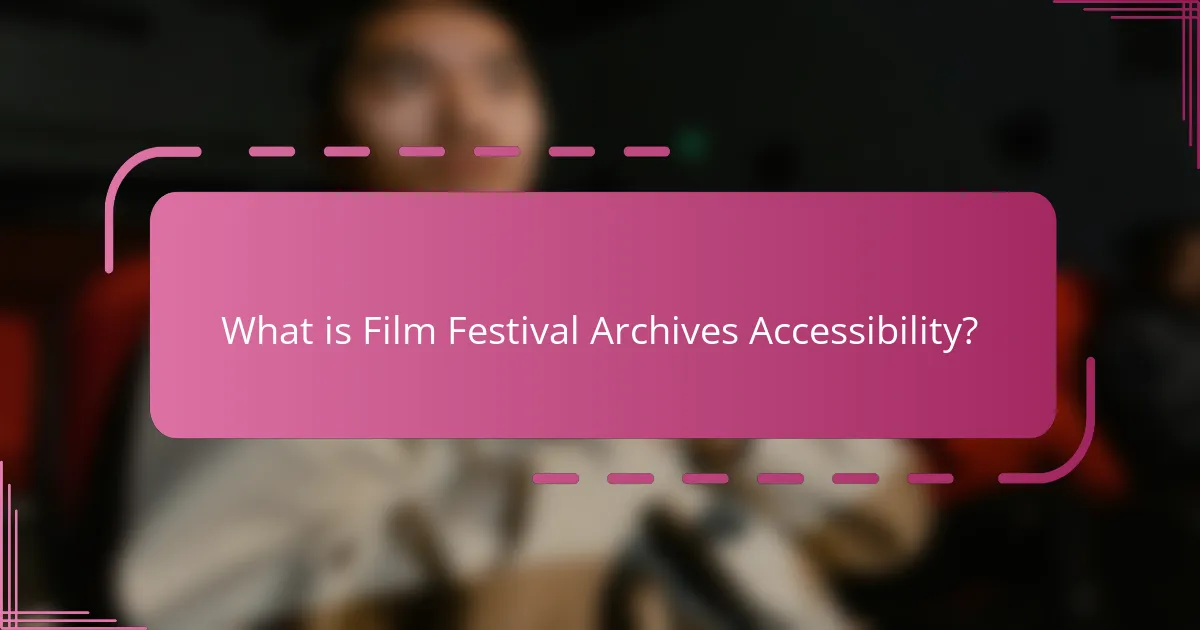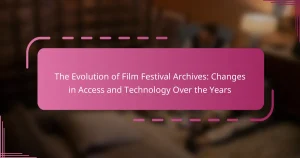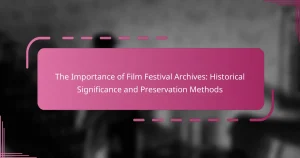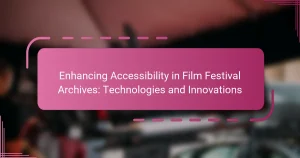Film Festival Archives Accessibility encompasses the availability of archival materials, including films, documents, and related media from film festivals, for public viewing and research. This article explores the importance of accessibility for researchers, filmmakers, and the general public in engaging with historical and cultural film content. It examines the varying policies implemented by different film festivals regarding access to their archives, highlighting issues related to copyright and usage rights. The discussion aims to clarify how these factors influence the balance between preserving film heritage and ensuring public access for educational purposes.

What is Film Festival Archives Accessibility?
Film Festival Archives Accessibility refers to the ease of access to archival materials from film festivals. This includes films, documents, and related media that are preserved for public viewing and research. Accessibility is crucial for researchers, filmmakers, and the public to engage with historical and cultural film content. It often involves considerations of copyright and usage rights. Various film festivals implement different policies regarding the availability of their archives. Some archives may be fully accessible online, while others may require physical visits or have restricted access. The goal is to balance preservation with public access to foster education and appreciation of film heritage.
How do film festival archives serve the public?
Film festival archives serve the public by preserving and providing access to films and related materials. They offer a historical record of cinematic works and cultural events. These archives allow researchers, educators, and the general public to explore film history. They often host screenings, exhibitions, and educational programs. Many archives also digitize films for online access, increasing reach and accessibility. By documenting diverse voices and stories, they promote cultural heritage. Film festival archives contribute to the preservation of independent and international cinema. This access supports film studies and enhances public appreciation of the art form.
What types of materials are included in film festival archives?
Film festival archives include a variety of materials. These materials typically consist of film prints, digital copies, and promotional materials. Additionally, they often contain scripts, production notes, and photographs. Press kits and festival programs are also commonly archived. Interviews with filmmakers and audience feedback may be included as well. Some archives hold awards and certificates related to the films. These collections serve to preserve the history and context of the films presented.
How are these materials organized for accessibility?
Materials in film festival archives are organized through a systematic classification system. This system includes categorization by genre, year, and director. Each entry is indexed for easy retrieval. Digital archives often use metadata for enhanced searchability. Accessibility features may include screen reader compatibility and alternative text for images. These practices ensure that users can find and utilize materials effectively. Research indicates that well-organized archives improve user engagement and satisfaction. For instance, a study by the American Library Association highlights the importance of accessibility in archival practices.
Why is understanding copyright important in film festival archives?
Understanding copyright is crucial in film festival archives to protect intellectual property rights. Copyright laws ensure that creators maintain control over their work. This control includes how their films are distributed, screened, and archived. Without understanding copyright, festivals may inadvertently violate these rights. Such violations can lead to legal disputes and financial penalties. Proper knowledge helps in obtaining necessary licenses for film screenings. It also guides the preservation of films in a way that respects creators’ rights. Overall, understanding copyright fosters ethical practices in film archiving.
What are the basic principles of copyright law as it relates to film archives?
Copyright law protects original works of authorship, including films. Film archives must adhere to copyright regulations when storing and sharing films. The owner of the copyright typically holds exclusive rights to reproduce, distribute, and display the work. Fair use provisions allow limited use of copyrighted material without permission under certain conditions. Archiving institutions may qualify for fair use if their purpose is educational or non-commercial. Additionally, licensing agreements can grant specific rights for public screenings or distribution. Copyright duration varies, typically lasting the creator’s life plus 70 years. Understanding these principles is crucial for compliance and access to film archives.
How does copyright influence the accessibility of archived films?
Copyright significantly restricts the accessibility of archived films. It protects the intellectual property rights of filmmakers and production companies. This legal framework often limits public access to films without permission. Many archived films remain unavailable due to copyright claims. Licensing fees can also hinder access, making it costly for institutions to showcase these films. Additionally, the duration of copyright can extend for decades, delaying public access. The 1976 Copyright Act in the U.S. exemplifies this, granting protection for the life of the author plus 70 years. Thus, copyright laws directly impact how and when archived films can be accessed by the public.
What are the usage rights associated with film festival archives?
Usage rights associated with film festival archives vary by festival and jurisdiction. Generally, these rights are governed by copyright law. Film festival archives may retain exclusive rights to the films they screen. This includes the right to reproduce, distribute, and publicly display the films. Filmmakers often grant limited rights to festivals through licensing agreements. These agreements may specify how the films can be used in the archive. Some festivals may allow educational use or research access under specific conditions. It is essential for users to review the terms of access and usage outlined by each festival.
What types of usage rights exist for archived films?
Archived films can have various types of usage rights, including copyright, licensing, and fair use. Copyright grants exclusive rights to the creator or rights holder. Licensing allows others to use the film under specified conditions. Fair use permits limited use without permission for purposes like criticism or education. These rights can vary based on jurisdiction and specific agreements. For instance, the U.S. Copyright Act outlines the framework for these rights. Understanding these distinctions is crucial for accessing archived films legally.
How can users determine their rights when accessing these materials?
Users can determine their rights by reviewing copyright notices associated with the materials. Each film or archive may have specific licensing terms outlined. Users should consult the institution’s website for guidelines on usage. Additionally, contacting the rights holder can clarify any uncertainties. Legal resources, such as copyright offices, often provide information on fair use. Understanding these elements helps users navigate their rights effectively.
How can film festivals improve accessibility to their archives?
Film festivals can improve accessibility to their archives by digitizing their collections. This process allows for easier online access to films and related materials. Implementing user-friendly search tools enhances the ability to locate specific content. Offering subtitles and audio descriptions makes films more accessible to diverse audiences. Collaborating with educational institutions can facilitate research access to archives. Establishing partnerships with streaming platforms can broaden distribution options. Providing clear information on copyright and usage rights is essential for legal compliance. These measures collectively enhance public engagement and educational opportunities with film archives.
What best practices can be implemented for better access?
Implementing best practices for better access to film festival archives involves several key strategies. First, digitizing archival materials enhances accessibility. Digital formats allow for easier distribution and retrieval. Second, establishing clear copyright guidelines is essential. These guidelines inform users about usage rights and restrictions. Third, providing comprehensive metadata improves searchability. Detailed descriptions help users locate specific content efficiently. Fourth, creating user-friendly online platforms facilitates access. Intuitive interfaces encourage broader engagement with the archives. Fifth, offering educational resources supports understanding of copyright issues. Workshops or online tutorials can empower users. Lastly, fostering partnerships with educational institutions expands outreach. Collaborations can increase visibility and usage of archival materials. These practices collectively enhance access to film festival archives while respecting copyright and usage rights.
How can technology enhance the accessibility of film festival archives?
Technology enhances the accessibility of film festival archives by digitizing content and improving search capabilities. Digital archives allow users to access films remotely from various devices. This reduces the need for physical attendance at festivals. Advanced search algorithms enable users to find specific films or information quickly. Metadata tagging further enhances discoverability by categorizing films based on genre, director, or year. Online platforms can host virtual screenings, expanding audience reach beyond geographical limitations. Additionally, technology can facilitate interactive features, such as user-generated content and community discussions. These advancements collectively make film festival archives more user-friendly and widely accessible.
What challenges do film festivals face regarding archive accessibility?
Film festivals face several challenges regarding archive accessibility. One major challenge is the complex copyright laws that govern film distribution. These laws often restrict access to archived films, limiting what can be publicly screened or shared. Additionally, many festivals lack the necessary funding to digitize and preserve their archives. This financial barrier hinders the ability to make films accessible to wider audiences.
Technical issues also pose a challenge, as outdated formats may not be compatible with modern viewing platforms. Furthermore, there is often a lack of standardized metadata, which complicates the search and retrieval of archived films. Lastly, the preservation of films can be compromised by physical deterioration over time. These factors collectively impact the accessibility of film festival archives.
How do legal restrictions impact accessibility efforts?
Legal restrictions significantly hinder accessibility efforts in film festival archives. Copyright laws limit the distribution and public display of archived films. These laws often require permissions from rights holders, which can be difficult to obtain. Furthermore, the duration of copyright can restrict access to older films that are still under protection. Legal limitations can also impose financial burdens on archives, making it costly to secure rights. As a result, many valuable films remain inaccessible to the public. This situation affects educational institutions and researchers who seek to study these works. Overall, legal restrictions create barriers that reduce the availability of archival content.
What are common misconceptions about copyright and usage rights?
Common misconceptions about copyright and usage rights include the belief that all creative works are automatically protected by copyright. In reality, copyright protection requires the work to be fixed in a tangible medium. Another misconception is that copyright lasts indefinitely. Copyright typically lasts for the life of the creator plus a set number of years, often 70 years. Many also think that using a small portion of a work constitutes fair use. Fair use is determined by specific factors, not just the amount used. Some believe that obtaining permission is unnecessary if a work is available online. However, online availability does not negate copyright protections. Additionally, there is a misunderstanding that copyright is the same as ownership. Ownership refers to the physical object, while copyright pertains to the rights to reproduce and distribute the work.
What steps can individuals take to responsibly use film festival archives?
Individuals can responsibly use film festival archives by first understanding copyright laws. They should verify the usage rights associated with each film. Consulting the archive’s guidelines is essential. Proper attribution to the creators must be provided when using content. Individuals should also seek permission for any intended public display or reproduction. Respecting the terms of use ensures compliance with legal standards. Additionally, citing sources accurately maintains academic integrity. Engaging with the archive staff can clarify any uncertainties about usage. Following these steps promotes ethical engagement with film festival archives.
Film Festival Archives Accessibility refers to the ease of access to archival materials from film festivals, including films, documents, and related media. The article outlines the importance of accessibility for researchers, filmmakers, and the public, highlighting the balance between preservation and public engagement. It discusses the types of materials included in archives, the organization methods for accessibility, and the impact of copyright laws on the availability of these resources. Additionally, the article covers best practices for improving access, the challenges faced by festivals, and the steps individuals can take to responsibly use archived materials.


